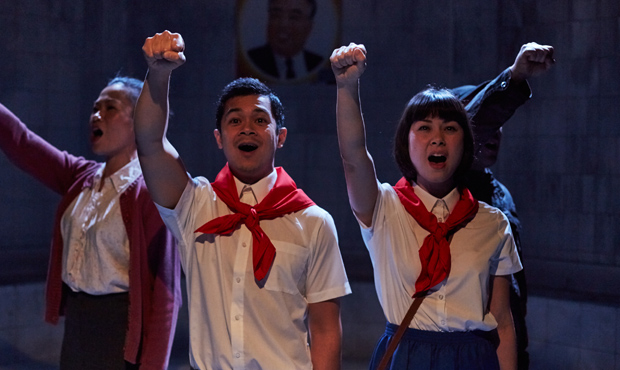P’yongyang (Finborough Theatre)

© Richard Lakos
North Korea is a story. In fact, it's two: one that it tells to its citizens, the other told by the rest of the world. Take the supposed nuclear test of two days ago. North Korea tells its citizens, via state media channels, that it has detonated a hydrogen bomb. Our own media channels, meanwhile, tell us to be sceptical.
Really, given the DPRK's closed borders and constant spin, we've no way of knowing the truth. It's a point In-Sook Chappell's third play makes with a crafty wit, sliding the story of two childhood sweethearts in and out of narrative cliché.
Park Chi Soo and Yeun Eun Mi both dream of stardom, auditioning for a prestigious drama school with an eye on careers in Kim Jong-Il's film studios in P'yongyang. Only one of them will make it: the state's caste system means Chi Soo, whose father was born in and fought for the South, is rejected out of hand and forced into extreme poverty, mining coal for a pittance. Eun Mi, meanwhile, rises to become one of the Dear Leader's favourites, a role that's sexual as well as cinematic.
It's such a familiar story that, initially, you hardly register its archetypal plot: two soulmates separated by a social order. It's Titanic, basically – the one Western film Eun Mi manages to watch. Chapell gradually brings sentimental stereotypes into focus – Daniel York's dictator being a ludicrous, slavering sex fiend of a villain – until you start to question every story you've ever heard about North Korea. The labour camps, the famines, the perilous border crossings – they all seem so stock.
And yet, not without some truth, surely? When finally reunited, Eun Mi hands the starving Chi Soo a single egg, which he ravenously devours. It seems too scripted a moment and yet, in the way he slides the shell off so desperately, it stands up as plausible. All stories start somewhere.
The slippage into self-awareness is beautifully handled and, at times, wryly funny. Daring, too – a writer letting her characters drift out of credibility, even tip into spoof. By using Hollywood clichés, Chappell not only highlights our Westernised perspective on North Korea, our incapability of understanding the mindset of communist, she also makes us question the cultural myths we've swallowed about our own society. Hollywood tells us who we are and what we value just as Kim Jong-Il's propaganda does. (He was, incidentally, a noted cinephile, supposedly authoring a treatise on the subject.)
However, once it's raised its doubts, there's not much more Chelsea Walker's production can do. In admitting the fragility of storytelling, P'yongyang erodes its own foundations and, sometimes, it just seems plain shallow. Chappell wraps things up swiftly, where she might have found some formal twist to finish: tangling an impossible knot of fact and fiction. It's a balance that Anna Leong Brophy and Chris Lew Hoi Sum play brilliantly, though, each finding an equal measure of flatness and humanity.
P'Yongyang runs at the Finborough Theatre until 30 January.










